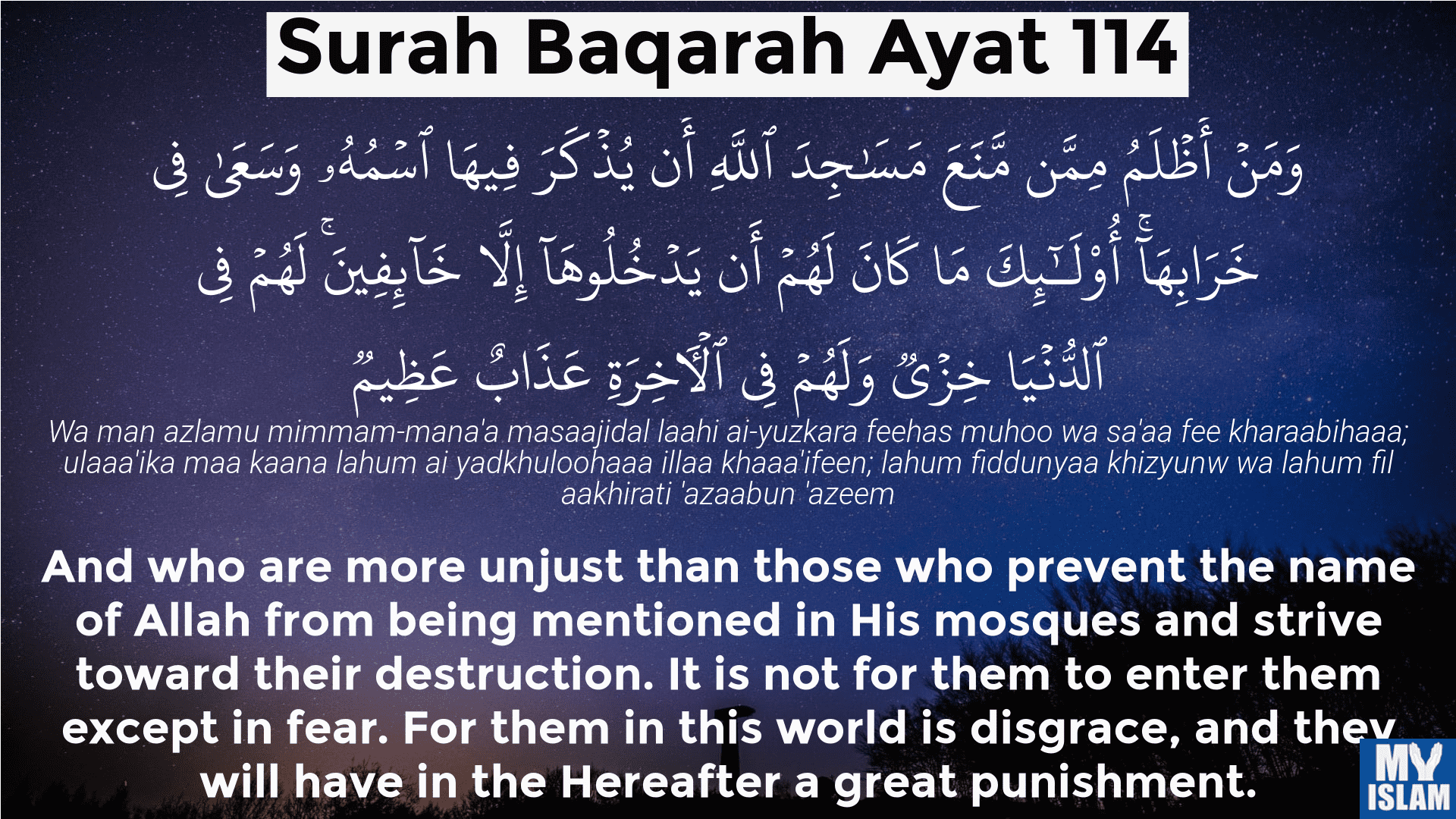Surah Baqarah Ayat 111 in Arabic Text
English Translation
Here you can read various translations of verse 111
And they say, “None will enter Paradise except one who is a Jew or a Christian.” That is [merely] their wishful thinking, Say, “Produce your proof, if you should be truthful.”
“And they say: “None shall enter Paradise unless he be a Jew or a Christian.” Those are their (vain) desires. Say: “Produce your proof if ye are truthful.”
They say, “None shall enter Paradise unless he be a Jew or according to the Christians) a Christian.” These are their wishful fancies. Say to them, “Bring your proof, if you are right in your claim.”
And they say, “None shall enter Paradise unless he be a Jew or a Christian.” These are their own desires. Say (O Muhammad Peace be upon him), “Produce your proof if you are truthful.”
And they say: None entereth paradise unless he be a Jew or a Christian. These are their own desires. Say: Bring your proof (of what ye state) if ye are truthful.
And they said, “Never will anybody enter the Garden except they who were Judaic or Nasara (i.e. Christians). Such (Literally: that) are their covetings. Say, “Offer your proof, in case you are sincere.”
They also say, ‘No one will enter Paradise unless he is a Jew or a Christian.’ This is their own wishful thinking. [Prophet], say, ‘Produce your evidence, if you are telling the truth.’
یہ کہتے ہیں کہ جنت میں یہود ونصاریٰ کے سوا اور کوئی نہ جائے گا، یہ صرف ان کی آرزوئیں ہیں، ان سے کہو کہ اگر تم سچے ہو تو کوئی دلیل تو پیش کرو
Quran 2 Verse 111 Explanation
For those looking for commentary to help with the understanding of Surah Baqarah ayat 111, we’ve provided two Tafseer works below. The first is the tafseer of Abul Ala Maududi, the second is of Ibn Kathir.
Ala-Maududi
(2:111) They say: “None shall enter the Garden unless he be a Jew or (according to the Christians), a Christian.” These are their vain desires.[112] Say: “Bring your proof if you are speaking the truth.”
112. That is, all this is merely wishful thinking, even though they express thoughts as if they were really going to happen.
Ibn-Kathir
111. And they say, “None shall enter Paradise unless he be a Jew or a Christian.” These are their own desires. Say (O Muhammad ), “Produce your Burhan if you are truthful.” 112. Yes! But whoever submits his face (himself) to Allah (i.e. follows Allah’s religion of Islamic Monotheism) and he is a Muhsin then his reward is with his Lord (Allah), on such shall be no fear, nor shall they grieve. 113. The Jews said that the Christians follow nothing (i.e. are not on the right religion); and the Christians said that the Jews follow nothing (i.e. are not on the right religion); though they both recite the Scripture. Like unto their word, said those (the pagans) who know not. Allah will judge between them on the Day of Resurrection about that wherein they have been differing.
Allah made the confusion of the Jews and the Christians clear, since they claim that no one will enter Paradise, unless he is a Jew or a Christian. Similarly, Allah mentioned their claims in Surat Al-Ma’idah:
(We are the children of Allah and His loved ones) (5:18).
Allah refuted this false claim and informed them that they will be punished because of their sins. Previously we mentioned their claim that the Fire would not touch them for more than a few days, after which they would be put in Paradise. Allah rebuked this claim, and He said about this baseless claim, m
(These are their own desires). Abu Al-`Aliyah commented, “These are wishes that they wished Allah would answer, without basis.” Similar was stated by Qatadah and Ar-Rabi` bin Anas. Allah then said,
(Say) meaning, “Say O Muhammad:”
(“Produce your Burhan…”) meaning, “Your proof”, as Abu Al-`Aliyah, Mujahid, As-Suddi and Ar-Rabi` bin Anas stated. Qatadah said that the Ayah means, “Bring the evidence that supports your statement,
(if you are truthful) in your claim. ”
Allah then said,
(Yes! But whoever submits his face (himself) to Allah (i.e. follows Allah’s religion of Islamic Monotheism) and he is a Muhsin) meaning, “Whoever performs deeds in sincerity, for Allah alone without partners.” In a similar statement, Allah said,
(So if they dispute with you (Muhammad ) say: “I have submitted myself to Allah (in Islam), and (so have) those who follow me.”) (3:20)
Abu Al-`Aliyah and Ar-Rabi` said that,
(Yes! But whoever submits his face (himself) to Allah) means, “Whoever is sincere with Allah.”
Also, Sa`id bin Jubayr said that,
(Yes! But whoever submits) means, he is sincere,
(his face (himself)) meaning, in his religion.
(and he is a Muhsin) following the Messenger . For there are two conditions for deeds to be accepted; the deed must be performed for Allah’s sake alone and conform to the Shari`ah. When the deed is sincere, but does not conform to the Shari`ah, then it will not be accepted. The Messenger of Allah said,
(Whoever performs a deed that does not conform with our matter (religion), then it will be rejected.)
This Hadith was recorded by Muslim. Therefore, the good deeds of the priests and rabbis will not be accepted, even if they are sincerely for Allah alone, because these deeds do not conform with the method of the Messenger , who was sent for all mankind. Allah said regarding such cases,
(And We shall turn to whatever deeds they (disbelievers, polytheists, sinners) did, and We shall make such deeds as scattered floating particles of dust.) (25:23)
(As for those who disbelieved, their deeds are like a mirage in a desert. The thirsty one thinks it to be water, until he comes up to it, he finds it to be nothing.) (24:39) and,
(Some faces, that Day will be humiliated. Laboring, weary. They will enter in the hot blazing Fire. They will be given to drink from a boiling spring) (88:2-5).
When the deed conforms to the Shari`ah outwardly, but the person did not perform it sincerely for Allah alone, the deed will also be rejected, as in the case of the hypocrites and those who do their deeds to show off. Similarly, Allah said,
(Verily, the hypocrites seek to deceive Allah, but it is He Who deceives them. And when they stand up for As-Salah (the prayer), they stand with laziness to be seen by people, and they do not remember Allah but little.) (4:142) and,
(So woe unto those performers of Salah (prayers) (hypocrites). Those who delay their Salah (from their stated fixed times). Those who do good deeds only to be seen (of men). And withhold Al-Ma`un (small kindnesses)) (107:4-7).
This is why Allah said,
(So whoever hopes for the meeting with his Lord, let him work righteousness and associate none as a partner in the worship of his Lord) (18: 110).
He also said in this Ayah,
(Yes, but whoever submits his face (himself) to Allah (follows Allah’s religion of Islamic Monotheism) and he is a Muhsin).
Allah’s statement,
(Shall have their reward with their Lord, on them shall be no fear, nor shall they grieve) guaranteed them the rewards and safety from what they fear and should avoid.
(There shall be no fear on them) in the future,
(nor shall they grieve) about what they abandoned in the past. Moreover, Sa`id bin Jubayr said,
“(There shall be no fear on them) in the Hereafter, and
(nor shall they grieve) about their imminent death.”
Allah said,
(The Jews said that the Christians follow nothing (i.e. are not on the right religion); and the Christians said that the Jews follow nothing (i.e. are not on the right religion); though they both recite the Scripture.)
Allah explained the disputes, hatred and stubbornness that the People of the Book have towards each other. Muhammad bin Ishaq reported that Ibn `Abbas said, “When a delegation of Christians from Najran came to the Messenger of Allah , the Jewish rabbis came and began arguing with them before the Messenger of Allah . Rafi` bin Huraymilah said, `You do not follow anything,’ and he reiterated his disbelief in Jesus and the Injil. Then a Christian man from Najran’s delegation said to the Jews, `Rather, you do not follow anything,’ and he reiterated his rejection of Musa’s prophethood and his disbelief in the Torah. So Allah revealed the Ayah,
(The Jews said that the Christians follow nothing (i.e. are not on the right religion); and the Christians said that the Jews follow nothing (i.e. are not on the right religion); though they both recite the Scripture. )”
Allah made it clear that each party read the affirmation of what they claimed to reject in their Book. Consequently, the Jews disbelieve in Jesus, even though they have the Torah in which Allah took their Covenant by the tongue of Moses to believe in Jesus. Also, the Gospel contains Jesus’ assertion that Moses’ prophethood and the Torah came from Allah. Yet, each party disbelieved in what the other party had.
Allah said,
(Like unto their word, said those who know not) thus exposing the ignorance displayed by the Jews and the Christians concerning their statements that we mentioned. There is a difference of opinion regarding the meaning of Allah’s statement,
(who know not)
For instance, Ar-Rabi` bin Anas and Qatadah said that,
(Like unto their word, said those said those who know not) means, “The Christians said similar statements to the Jews.” Ibn Jurayj asked `Ata’ “Who are those `who know not”’ `Ata’ said, “Nations that existed before the Jews and the Christians and before the Torah and the Gospel.” Also, As-Suddi said that,
(said those who know not) is in reference to the Arabs who said that Muhammad was not following anything (i. e. did not follow a true or existing religion). Abu Ja`far bin Jarir chose the view that this Ayah is general and that there is no evidence that specifically supports any of these explanations. So interpreting the Ayah in a general way is better. Allah knows best.
Allah said,
(Allah will judge between them on the Day of Resurrection about that wherein they have been differing.) meaning, that Allah will gather them all on the Day of Return. On that Day, Allah will justly judge between them, for He is never unjust with anyone, even as little as the weight of an atom. This Ayah is similar to Allah’s statement in Surat Al-Hajj (22:17),
(Verily, those who believe (in Allah and in His Messenger Muhammad ), and those who are Jews, and the Sabians, and the Christians, and the Majus, and those who associate partners with Allah; truly, Allah will judge between them on the Day of Resurrection. Verily, Allah is over all things a Witness).
Allah said,
(Say: “Our Lord will assemble us all together (on the Day of Resurrection), then He will judge between us with truth. And He is the Just Judge, the Knower of the true state of affairs.”) (34:26).
Quick navigation links






